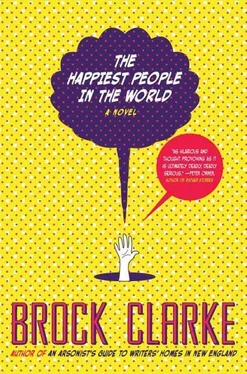“I’m calling the police!” Ilsa shouted from inside the house.
“Your husband is supposed to be dead!” he said, and then he kept banging and shouting, “Supposed to be dead!” loudly enough and for long enough that some of the neighbors started louvering their windows closed, or open, depending on the previous state of their windows and depending on what kind of people they were.
“You really don’t want to be here when the police come,” a woman’s voice said behind him. She spoke in English. Søren turned and saw it was the American from the gas station in Skagen, the one who couldn’t get her credit card to work. She was still wearing her baseball hat with the letter C on it, but otherwise she looked almost completely different. Not so helpless anymore. She smiled at him, the way people do when they want you to know that they know something that you want to know.
“How do you know?”
“I just do.”
“I don’t care,” Søren said. “I want to know where her husband is.”
“I know that, too,” the woman said.
Søren followed the woman back to Skagen, to a house, a holiday cabin, snug in the dunes of Gammel Skagen. Søren got out of his car, looked up, and saw smoke coming from the chimneys of all the other houses nestled in the dunes. Otherwise, it seemed like they were alone, alone with the gulls and the distant sound of the waves and the blowing sand.
Søren and the woman walked inside the house, into the kitchen, where they sat across from each other at a scarred wooden table. The house had other rooms, and they’d passed through a couple of them on the way to the kitchen, but the kitchen was the only room that contained furniture. “Do I know you?” he asked.
“I know you,” the woman said. “You live on Lochersvej with your father. Your mother is dead. Your little buddy lives just down the street from you.”
“Tarik?” Søren said.
“No need to thank us for getting you and your little buddy those jobs at the boatyard.”
Søren thought about that. Neither Tarik nor he had had any experience making boats, or fixing boats, or taking care of boats, or even being passengers on boats. And yet they applied for jobs and their applications were immediately accepted. “We had no experience,” Søren said.
“You didn’t have any experience burning down buildings, either,” the woman said. “And yet. .”
Søren just looked at her in amazement. You know everything about me, he thought, and then he wondered whether she knew that he was thinking that. Was this what meeting Allah would be like? Søren wondered. You lived your life thinking that you had some control over it, that you were the one making important decisions, and then you met Allah, who said, Well, actually. .
“Why didn’t you arrest me?”
“I knew you were thinking that.”
“I hate you.”
“And that’s why we didn’t arrest you. Because there’s lots of people who already hate us. If we arrested you, then other Muslims would have rallied around you. There might have been more fires. Someone might have actually been killed this time. We thought it would be better for everyone if we pretended the cartoonist was dead.”
It wasn’t better for me, Søren thought. But was that even true? Was it worse to go to prison for arson or to stay free and believe you were a murderer? But it was impossible to say definitively, because he had only had experience staying free and believing he was a murderer.
“Plus,” the woman said, “you didn’t seem all that bad. We didn’t think it was likely that you’d be killing anyone else.”
“That’s true,” Søren said, before he remembered. It was difficult to instantly recall that everything you’d believed about yourself for four years was an absolute lie. “But I didn’t kill anyone in the first place!”
“That’s right,” the woman said, chuckling. “Sometimes I forget that, too.”
“I hate you so much,” Søren said.
“Well, yeah,” the woman said. “But I bet you hate someone else even more.”
Søren thought about that. He knew she was talking about the cartoonist. How much did Søren hate him? On the one hand, he hated that the cartoonist was still alive. On the other hand, Søren loved that he had not killed him. Meanwhile the woman was watching him think. “Because he definitely hates you,” she said. “Just in case you were wondering.”
“Why are you telling me all this?”
“I want you to kill him,” the woman said.
“Why don’t you do it yourself?”
“That’s a common misunderstanding about secret agents. We don’t usually kill people ourselves. We usually try to get other people to do it for us.”
“We,” repeated Søren.
“What’s that?”
“You said ‘we.’ ‘We don’t usually kill people ourselves.’ ”
“OK.”
“But before that you said ‘I.’ ‘I want you to kill him.’ ”
“I meant ‘we,’ ” the woman said.
Did you? Søren thought, carefully considering her, and also the table between them. The table really was scarred — big random furrows crisscrossing the surface — and faded, too, like it had been left too long out in the weather. This was a table that had been abandoned, not sold or bought. The house seemed abandoned, too: it was cold in the kitchen, Søren could see his breath. The lights weren’t on, either. The woman seemed to see him assessing the room; she adjusted her hat, then adjusted it again. “You didn’t even know the PIN for your credit card,” Søren said.
“Listen, Søren,” she said, putting both hands on the table. It wobbled a little when she did that. “Are you going to kill him or not?”
Søren sat back in his chair to think about it. He thought about how awful it had felt when he’d actually believed he was a murderer and how he never wanted to feel that way again. But then Søren thought of that cartoon, and then of the cartoonist, out there somewhere, having a good laugh over how he and this woman and who knows who else had tricked Søren into thinking he was something he was not for the past four years, and suddenly Søren was overwhelmed by a sense of the world’s injustice: he could actually feel the injustice, in his head and around his eyes, like it was a sinus thing. It was the kind of feeling that you would do almost anything to get rid of. But did that include murder? “I just don’t know,” Søren said, and the woman nodded as though she’d expected that answer. She took her cell phone out of her jacket pocket and said, “I wonder what your father will think when I call and tell him about his terrorist-arsonist son.”
“No!” Søren said. Because suddenly he could see his father’s face, the look on it making the journey from disbelief to disappointment to shame. The only thing worse than your father finding out about the terrible things you’ve done is thinking about your father finding out about the terrible things you’ve done. “I’ll do it,” Søren said.
“I knew you would,” the woman said. She smiled quickly, showing no teeth, and then talked, in detail, about how Søren was going to do what she wanted him to do.
One o’clock, the first Wednesday in October. Henry’s office. Kurt, sixteen years old, fresh from driver’s ed, confiding in his guidance counselor, who in three days was also going to be his stepfather.
“Dad seems lonely,” Kurt was saying, and Mr. L. crossed his arms, frowned. Kurt tried again. “Dad is lonely,” he said, and Mr. L. stopped frowning, as though to say, That’s more like it.
“And that makes you feel. .”
Читать дальше












